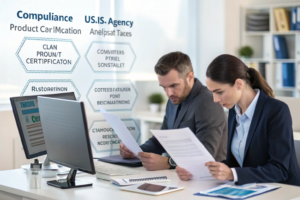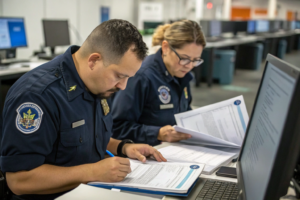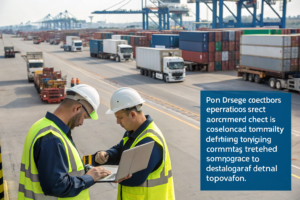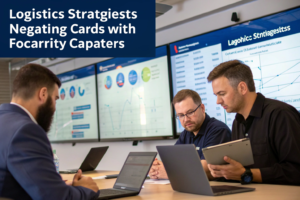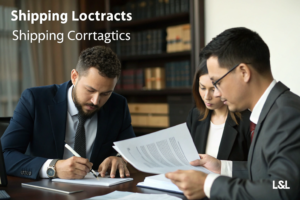Shipping internationally can unlock new markets and massive revenue—but it can also result in unexpected tariff charges if done incorrectly. Too many buyers assume that shipping is just about booking containers or picking the cheapest quote. In reality, small mistakes in paperwork, packaging, or HS codes can lead to thousands in extra duties.
In this article, we’ll break down the top mistakes that cause tariff penalties—and show you how to avoid them through strategic planning, correct declarations, and working with experienced freight forwarders like GeeseCargo.
Whether you're importing clothing, electronics, or consumer goods from Asia to the U.S. or Europe, avoiding these common errors can save you thousands.
Are You Using the Wrong HS Code for Your Products?
HS codes are like a product's passport. When declared incorrectly, they trigger unnecessary scrutiny—and often, higher taxes. Misclassification is one of the most frequent causes of unexpected tariff spikes.
Every product imported must be declared under a correct Harmonized System (HS) code, which determines the applicable duty rate and taxes.

Why Do Incorrect HS Codes Lead to Higher Duties?
Because each HS code corresponds with a specific duty rate, choosing the wrong one can result in overpayment—or underpayment that gets penalized later. For example, mislabeling “cotton shirts” as “synthetic” can jump your tariff rate from 8% to 16%.
You can verify proper classifications using tools like the HTSUS search portal or WCO HS Explanatory Notes. At GeeseCargo, we also offer pre-clearance reviews to make sure your codes match your products.
Can HS Codes Be Pre-Approved by Customs?
Yes, through an Advance Ruling Request, you can submit product samples and specs to customs authorities and get written confirmation of the correct HS code. This locks in your tariff rate before shipping and avoids post-entry corrections.
Our team has helped many U.S. and EU importers secure advance rulings, especially for complex items like multi-fiber garments, gift sets, or electronics kits.
Is Your Declared Value Too Low or Incomplete?
Many companies try to lower their import taxes by underdeclaring product value. While tempting, this is a huge red flag for customs—and it usually backfires.
Underdeclaring the value of goods or failing to list all chargeable items can result in audits, fines, and revaluation by customs.

What Is the Correct Way to Declare Value?
Your declared value should reflect the transaction value—the price paid or payable for the goods, including any assists, royalties, or commissions. This is required under the WTO Customs Valuation Agreement.
If you omit costs like packaging, product development, or mold fees, customs can re-assess your value upward. That leads to additional taxes and may block future “trusted trader” status.
What Tools Help Ensure Accurate Valuation?
We advise clients to use a consistent invoice template that breaks out FOB value, freight, insurance, and extras. Our platform also links commercial invoices to CBP’s ACE system, ensuring seamless electronic data review and reducing clearance delays.
Freight forwarders like GeeseCargo can assist you in matching invoice details with port expectations, so your cargo isn’t red-flagged during inspection.
Are Your Certificates of Origin or FTA Documents Missing?
Free Trade Agreements (FTAs) can save you thousands in duty reductions—but only if you submit the right supporting documents. Forgetting to include these leads to unnecessary full-tariff charges.
Missing or mismatched Certificates of Origin (C/O) will void your duty preferences—even when your goods qualify for reduced tariffs.

Which FTAs Matter Most for Asian Exporters?
The U.S. offers FTA and GSP programs for imports from South Korea, Thailand, and Taiwan. Europe accepts preferential treatment under EUR.1 or GSP Form A. Failure to file these documents means you'll pay standard WTO rates, often 5–15% more.
At GeeseCargo, we coordinate directly with your factory to obtain proper, signed C/O forms. We also help digitize and attach them to your shipping declaration.
Can You Submit Documents After Arrival?
Sometimes. Under CBP’s 19 CFR 10.173, post-entry adjustments are possible, but they require complex legal paperwork and cause delays. It’s best to submit documents at the time of import.
We also recommend registering your importer ID with customs to avoid mismatch errors when C/O details don’t match your EIN or legal entity name.
Are You Choosing the Wrong Incoterms for Your Shipment?
Many importers think Incoterms are just shipping lingo. In reality, your Incoterm defines who is liable for import taxes and fees—and choosing the wrong one can surprise you with extra costs.
Incoterms like EXW (Ex Works) put full customs responsibility on the buyer, while DDP (Delivered Duty Paid) includes taxes and simplifies your landing cost.

Why Is EXW Risky for International Buyers?
EXW means your supplier just makes goods available at their factory. You are responsible for freight, insurance, customs paperwork, and all tariffs. Many importers don’t realize this until they receive a customs bill that’s 20% higher than expected.
We recommend FOB or DDP terms, which shift risk and documentation to the forwarder. Incoterms 2020 defines each term’s role in import cost responsibility.
How Can DDP Eliminate Surprise Tariff Charges?
When you ship under DDP, the freight forwarder like GeeseCargo handles all import duties, fees, and taxes. This gives you a clear landed cost upfront—ideal for e-commerce sellers and high-volume buyers.
We also offer DDP for door-to-door from China to U.S., including Amazon FBA destinations. You’ll get customs clearance, tax calculation, and inland delivery without lifting a finger.
Conclusion
International shipping offers huge opportunities—but only if you avoid mistakes that cause unnecessary tariff charges. The most costly errors—wrong HS codes, undervalued invoices, missing FTA documents, and confusing Incoterms—are entirely preventable.
At GeeseCargo, we guide every customer through a seamless declaration process. With our help, your shipments arrive cleanly, efficiently, and without surprise tax bills. For expert help and personalized support, contact Ben Zhu at benzhu@geesecargo.com today.

